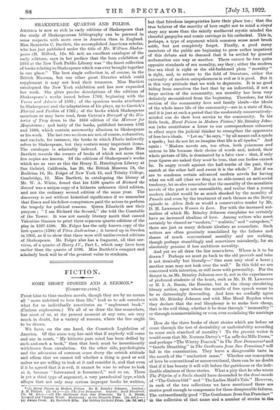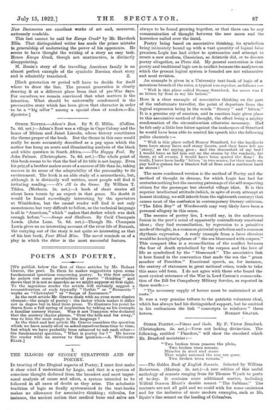FICTION.
SOME SHORT STORIES AND A SERMON.* [ComaaueacaTen.1 Pawl time to time modern novels, though they are by no means all " more indebted to love than life," lead us to ask ourselves what for us individually constitutes an " unpleasant book." (Curious euphemism.) We all of us draw the line somewhere, but most, of us, at the present moment at any rate, are very much in doubt, for a variety of reasons, where the line ought to be drawn.
We have, on the one hand, the Comstock Legislation of America. Of this some wag has said that if anybody will come and say in court, " My hitherto pure mind has been defiled by ouch-and-such a book," then that book must be incontinently withdrawn from circulation. Oil the other side, psychologists and the advocates of common sense decry the ostrich attitude and affirm that we cannot tell whether a thing is good or evil unless we are willing to look at it and consider it, and that even if it be agreed that it is evil, it cannot be wise to refuse to look at it, because " forewarned is forearmed," and so on. There is yet a third type of argument, a very paradoxical type,which alleges that not only may serious improper books be written,
• (1) Moral Poison in Modern Fiction. By B. Brimley Johnson. London A. M. Philpot. [2s. 65.1—(2) The New Decameron. Oxford : Basil Blackwell. re. 65. net.'--.(3) The Gentleman from San Francisco. By I. A. Bunin, Leonard and Virginia Woolf. Richmond : at the Hogarth Press. [4a. net.[--- (4) Kowa Cree.t, By Havelock Ellis. The Golden Cockerel Preis. [4s. ed. net.] but that frivolous improprieties have their place too ; that the true believer of the sanctity of love ought not to mind a risqui story any more than the saintly mediaeval mystic minded the cheerful gargoyles and comic carvings in his cathedral. This is, perhaps, a type of argument which common sense must brush aside, but not completely forget. Finally, a good many members of the public are beginning to grow rather impatient of this debate and to demand that it be settled by general acclamation one way or another. There cannot be two quite opposite standards of sex morality, say they ; either the modern free sex ideal is right or the old-fashioned plain " morality" is right, and, to return to the field of literature, either the extremity of modern outspokenness is evil or it is good. But it is this very attitude that we wish to deprecate. It is no good hiding from ourselves the fact that by an influential, if not a large section of the community, sex morality has been very definitely reconsidered from the beginning. Therefore, for this section of the community love and family ideals—the ideals of the whole inner life of the community—are in a state of flux, and it is just at such a period that the moderately conservatively- minded can do their best service to the community. In his little book, Moral Poison in Modern Fiction,' Mr. Brimley John- son (who contributes a letter to our correspondence columns) in effect urges the judicial thinker to strengthen the opponents of free-love ideals. " Let us," he says, " by all means call a spade a spade ; but do not let us imagine that life is all spades." And again : " Modem novels are, too often, both poisonous and untrue to life because their choice of words and, indeed, their whole picture of life, is dominated by a false view : that, if only your figures are naked they must be true, that our bodies cannot lie. In angry revolt against the half-truths of the past, they snatch at the other half and swear it is the whole." But if we are to condemn certain advanced modern novels for having what we will call (that we drag in no side-issues) an anti-social tendency, let us also remember that the morality of the moralistic novels of the past is not unassailable, and realize that a young modern idealist would be as much shocked by the morality of Pamela and even by the treatment of such themes as the Betty episode in Adam Bede as would a conservative reader by Mr. I). H. Lawrence's Women in Love. For with the increased ani- malism of which Mr. Brimley Johnson complains we certainly have an increased idealism of love. Among writers who must certainly be classed as "modern," " realistic," and " outspoken," there are just as many delicate idealists as sensualists. Such writers are often genuinely scandalized by the failures and shams of much conventional morality and are seeking, though perhaps stumblingly and sometimes mistakenly, for an absolutely genuine if less ambitious morality.
And yet we all draw the line somewhere. Where is it to be drawn ? Perhaps we must go back to the old proverb and take it not ironically but literally—" One man may steal a horse ; another man may not look over the wall." In this field we are concerned with intention, or still more with personality. For the danger is, as Mr. Brimley Johnson sees it, not in the experiments of profound students of the heart, such as Mr. D. H. Lawrence or M. L A. Bunin, the Russian, but in the cheap circulating library author, upon whom the mantle of free speech seems to be so distressingly descending. And here we cordially agree with Mr. Brimley Johnson and with Miss Maud Hoyden when they declare that the real blasphemy is to make love cheap, that is the evil thing, whether it be done through " immorality " or through commercializing or even over-socializing the marriage tie.
How do the three books of short stories which are before us come through the test of desirability or undesirability according to some such standard of morality ? To the present writer it would seem that Mr. Norman Davey's "La sane des Mille Peons,"
and perhaps "The Wintry Peacock" in The New De.cameron2and " Gentle Breathing" in The Gentleman from San Francisco,3 will fail in the examination. They leave a disagreeable taste in
the mouth of the " unchariest muse." Whether our conception of love be conventional or unconventional, there can be no doubt that if it has beauty it will wilt before the garishness or the inde- finable sliminess of these stories. What a pity that he who wrote The Pilgrim of a Smile should have descended to the demi-monde of "The Guinea Girl" and " The Ladies-Maid's Tale." However,
in each of the two collections we have mentioned there are stories good enough to compensate for these disagreeable failures. The extraordinarily good "The Gentleman from San Francisco " in the collection of that name and a number of stories in the New Decameron are excellent works of art and, moreover, extremely readable. This last cannot be said for Kugel Creek' by Mr. Havelock Ellis. That distinguished writer has made the prime mistake in generalship of underrating the power of his opponents. He seems to have thought the writing of a story an easy task. Hence Earnga Creek, though not unattractive, is distinctly disappointing.
M. Bunin's story of the travelling American family is an almost perfect example of the symbolic Russian short story
[Each generation or period will have to decide for itself where to draw the line. The present generation is clearly drawing it at a different place from that of pre-War days. For ourselves, we remain convinced that what matters is the intention. What should be universally condemned is the provocative story which has been given that character in order -to be a " big seller " among a special class of readers.—En. Spectator.]



































 Previous page
Previous page